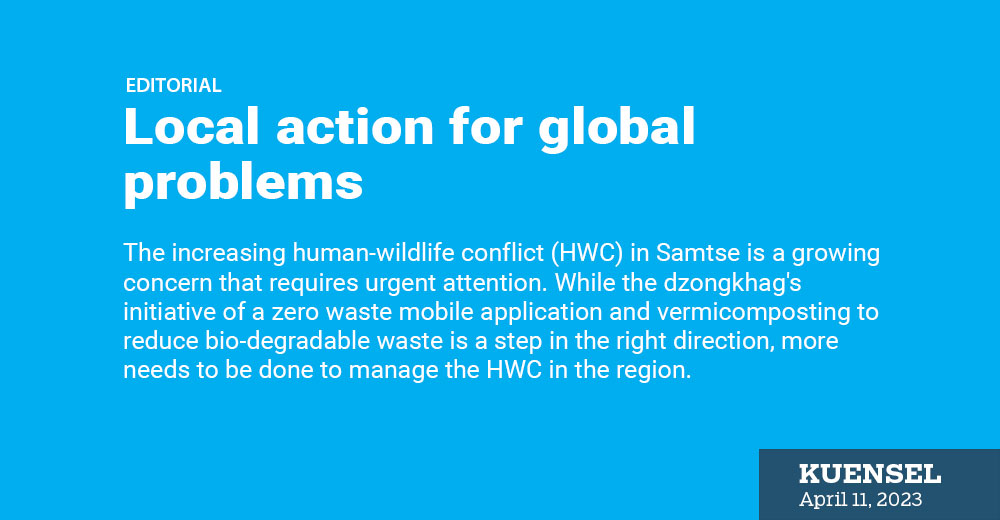The increasing human-wildlife conflict (HWC) in Samtse is a growing concern that requires urgent attention. While the dzongkhag’s initiative of a zero waste mobile application and vermicomposting to reduce bio-degradable waste is a step in the right direction, more needs to be done to manage the HWC in the region.
The landfill in Khandothang, which is already over 60 percent full, has become a feeding ground for wild elephants that visit it daily. This poses a significant threat to the safety of residents in Khandothang and Tashichhoeling, who fall into the elephant-prone zone. Farmers in the region have also been experiencing frequent crop predation by these pachyderms, affecting their livelihoods.
The lack of laws and policies on compensation for livestock killed and crops damaged by wildlife has left people living around the protected areas suffering economic losses. This situation needs to be addressed urgently, and farmers should be compensated for their losses. If these waste management and HWC issues are not addressed in time, there could be severe consequences for both the environment and the people living in the dzongkhag. Improper waste management could lead to the pollution of water bodies, air, and soil, negatively impacting human health and wildlife.
The accumulation of waste in landfills can also lead to the release of methane gas, a potent greenhouse gas that contributes to climate change. Additionally, waste pollution can harm natural habitats of wildlife and disrupt ecosystems, leading to further conflicts between humans and wildlife.
Our experience has shown that increasing HWCs in the region can have devastating consequences for both wildlife and humans. Wildlife such as elephants are likely to face the risk of habitat loss and population decline due to conflict with humans. Meanwhile, humans are suffering economic losses, injury, and even death due to the conflict.
The lack of compensation policies for farmers whose crops are damaged or livestock are killed by wildlife could push them into poverty and lead to a breakdown of trust between the government and the people, resulting in a vicious cycle of conflict and underdevelopment in the region.
Moreover, failing to address the waste management and human-wildlife conflict issues in Samtse could hinder the country’s progress towards achieving its sustainable development goals (SDGs), particularly those related to environmental sustainability and poverty reduction. The SDGs aim to ensure access to clean water and sanitation, reduce inequalities, and promote sustainable economic growth.
It is crucial, therefore, to address these issues in a timely and effective manner, involving all stakeholders, including local communities, government officials, and conservation organisations.
A collaborative and sustainable approach that balances economic development with environmental conservation can help mitigate the negative impacts of waste management and human-wildlife conflict in Samtse. It is essential to take care of our waste;small actions like the zero waste mobile application and vermicomposting can go a long way in achieving environmental sustainability and reducing HWC.


